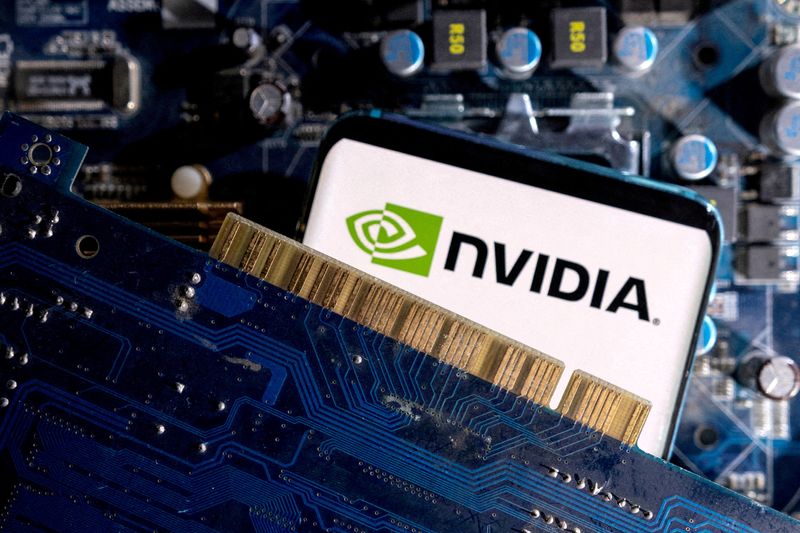By Lewis Krauskopf
NEW YORK (Reuters) - A bruising selloff in U.S. stocks is putting a sharper focus on valuations of the tech names such as Nvidia and Microsoft (NASDAQ:MSFT) that have driven markets higher for most of this year.
Despite a recent pullback, the S&P 500 tech sector is trading at 29.5 times 12-month earnings estimates, near a two-decade high reached earlier this month. The overall market is also elevated historically, with the benchmark S&P 500 index trading at 20.7 times forward estimates, compared to its long-term average of 15.7, data from LSEG Datastream showed.
"Markets today are pretty expensive to us at a broad level," said Philip Straehl, chief investment officer, Americas, at Morningstar Wealth.
"That just creates some opportunity for disappointment," he said, pointing to high market expectations of a soft landing for the U.S. economy and for individual company performances.
Market participants were happy to pay up for tech and growth stocks for most of 2024, as excitement over the business potential of artificial intelligence spurred rallies in companies such as chipmaker Nvidia, whose shares are up nearly 130% this year.
Recent market action shows investors becoming more wary of richly valued stocks. Earnings results from Tesla (NASDAQ:TSLA) and Alphabet (NASDAQ:GOOGL) staggered stocks earlier this week, dealing the S&P 500 and Nasdaq Composite their biggest daily losses since 2022 on Wednesday. Both indexes remain solidly higher in 2024, up 14.5% and 15.6%, respectively, despite sharp declines since mid-July.
Results from megacaps Amazon (NASDAQ:AMZN), Apple (NASDAQ:AAPL), Microsoft and Facebook (NASDAQ:META) parent Meta Platforms are due in the coming week, raising the stakes for investors who piled into large tech and tech-related shares.
Elevated valuations could also lead investors to unload stocks if markets face turbulence from other sources, including changes in expectations the Federal Reserve will cut interest rates in coming months and political risk from an already-dramatic presidential race.
U.S. companies overall face lofty financial expectations, with S&P 500 earnings expected to have climbed 12.1% in the second quarter from a year earlier, according to LSEG IBES. With 206 companies posting results so far, 78.6% reported profits above analyst expectations, in line with the beat rate of the past four quarters.
"The market's going to be looking for pretty stellar results, given how much valuation re-rating has happened," said Matthew Miskin, co-chief investment strategist at John Hancock Investment Management.
Many investors will focus on the tech sector and the so-called Magnificent Seven megacaps that are heavily weighted in the S&P 500 and Nasdaq. An example of the market’s recent mood shift was reflected in the reaction to Alphabet’s earnings: the company’s shares slumped 8% over the past three sessions, as investors grew concerned that investments in AI infrastructure would squeeze margins, even though revenues topped expectations.
"The bar is pretty high for those tech stocks," said Chuck Carlson, chief executive officer at Horizon Investment Services. "People really still need to be wowed. And if you're not wowing, then you're kind of vulnerable to a sell-off."
The spotlight will shine on Apple and Microsoft, the two biggest U.S. companies by market capitalization, both valued at over $3 trillion.
Apple is trading at 30 times earnings estimates, well above its five-year average of 25.5 and 10-year average of 19.6, according to LSEG Datastream. At 31 times, Microsoft is above its five-year average P/E of 29 and 10-year average of nearly 25.
Some say lofty valuations support the case for a rotation trade that has seen investors liquidate their large-cap tech stocks and move into small caps, value stocks and other areas that had produced tepid returns for most of the year.
Since July 10, the small-cap Russell 2000 is up 10% while the S&P 500 has dropped 3%.
"We think investors will continue to rotate away from expensive tech names as (earnings) growth returns elsewhere," analysts at Oxford Economics said in a note on Friday.
To be sure, not all tech and megacap stocks may seem expensive, particularly after the recent market slide. Meta Platforms, for example, is trading at 20.6 times forward estimates, compared to its 10-year average of 25.
More broadly, valuations remain far lower than the early 2000s, around the dot-com bubble, when the tech sector's P/E ratio reached 48 times.

At the same time, better-than-expected results could bolster the case for tech stocks' elevated valuations and give investors a much-needed confidence boost.
Analysts at UBS Global Wealth Management noted on Thursday that S&P 500 earnings growth is on pace for its biggest rise in over two years. They expect the S&P 500 to end the year at 5,900, some 8% above current levels. "Investors should be prepared for periodic market dips," the UBS analysts said. "However, we continue to expect the S&P 500 to recover."